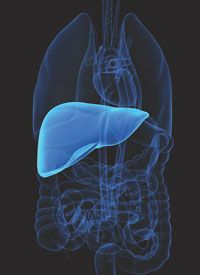Nivolumab Demonstrates Long-Term Responses in Sorafenib-Experienced HCC Patients
Patients with advanced hepatocellular carcinoma who were previously treated with sorafenib had long-term responses to nivolumab of more than 1 year.
Liver

Patients with advanced hepatocellular carcinoma (HCC) who were previously treated with sorafenib had long-term responses to nivolumab (Opdivo) of more than 1 year, according to findings from the CheckMate-040 trial presented at the 2017 International Liver Congress.
At a median follow-up of 12.9 months, the objective response rate (ORR) by blinded independent central review was 14.5%, and ORR 19.3% by investigator assessment. At present, response is ongoing in 71.4% of patients, and the median duration of response (DOR) was not reached. The 12-month overall survival (OS) rate was 59.9% and median OS was 16.7 months.
“HCC is the second most common cause of cancer-related deaths worldwide. There are no standard treatment options for patients with advanced HCC who progress on sorafenib, and the prognosis is poor for these patients,” said Jörg Trojan MD, Goethe University Hospital and Cancer Center in Frankfurt, Germany. “The durable responses and survival rates that were achieved with nivolumab are very encouraging, particularly as the side effects were manageable.”
Chronic hepatitis virus infection and programmed death-1 ligand (PD-L1) expression status of the tumor did not appear to play a role in determining which patients had long term response. PD-L1 expression in this study was set at 1%.
Trojan presented interim results from the sorafenib-experienced cohort of the phase 1/2, multi-cohort, open-label CheckMate-040 study of nivolumab in patients with advanced HCC who were not candidates for surgery (n = 145). In the dose-expansion portion of the study, the patients received nivolumab at 3 mg/kg every 2 weeks. All patients had previously received sorafenib. Most patients (91.0%) experienced disease progression while on treatment and 8.3% were intolerant.
Nivolumab is a fully human IgG4 monoclonal antibody that inhibits binding of PD-1 to its ligand PD-L1 that has shown high rates of response in several cancer types, including HCC.
Earlier this year, researchers presented an evaluation of the overall population (N = 262) performed at 9 months that suggested nivolumab could be an option for the treatment of patients with HCC that failed sorafenib; median DOR was 9.9 months, and the 9-month OS rate was 74%.
Chronic hyepatitis infection is an underlying cause in most HCC cases. In this study, nivolumab response was independent of chronic hepatitis B (HBV) and/or hepatitis C (HCV) infection. However, patients with chronic hepitatits infections did reach median OS.
ORR was 20.0% among patients with HCV (n = 30) and 14% among those HBV infection (n = 43). ORR was 12.5% in uninfected patients (n = 72). The 12-month DOR rates were 50% in both the HCV and HBV cohorts, and 22.2% in uninfected patients.
There were no complete responses (CR) in the uninfected cohort, but 1 patient in each of the HCV and HBV cohorts achieved CR. Five patients (16%) in the HCV group had partial response, 9 (30%) had stable disease, and 11 (36.7%) experienced progression. In the HBV group, 11.6% had partial response stable disease, 32% had stable diseae, and 51.4% of patients had progression. Among uninfected patients, 12.5% had partial response, 51.4% had stable disease, and 31.9% had progressive disease.
Overall, the safety profile of nivolumab in patients with advanced HCC was consistent with that reported in other tumor types. Grade 3-4 treatment-related adverse events (AEs) occurred in 16.6% of patients. Fewer than 3% of patients experienced grade 3-4 ALT/AST elevations and researchers said those conditions were “manageable and reversible” with established algorithms.
“Nivolumab demonstrated durable responses with long-term survival and manageable safety in sorafenib-experienced patients with advanced HCC, with or without chronic viral hepatitis,” Trojan said, “These results support the ongoing phase III trial evaluating nivolumab in patients with advanced HCC that are systemic treatment-naïve.”
Reference:
Sangro B, Yau T, Hus C, et al. Nivolumab in sorafenib-experienced patients with advanced hepatocellular carcinoma (HCC) with or without chronic viral hepatitis: CheckMate 040 study. Presented at: 2017 International Liver Congress; April 19-23, 2017; Amsterdam, Netherlands. Abstract GS-010.
Enhancing Precision in Immunotherapy: CD8 PET-Avidity in RCC
March 1st 2024In this episode of Emerging Experts, Peter Zang, MD, highlights research on baseline CD8 lymph node avidity with 89-Zr-crefmirlimab for the treatment of patients with metastatic renal cell carcinoma and response to immunotherapy.
Listen